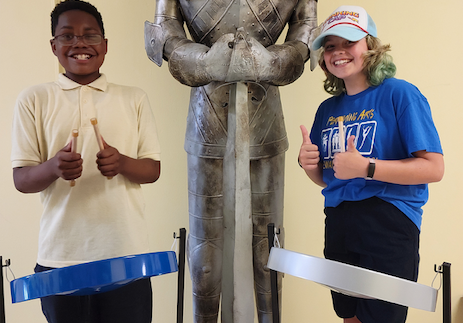
19 Jun Music Curriculum for Special Education
Earlier this year, our team at Panyard connected with a school in Wilmington, Delaware, on a project for their music program.
“Our music teacher, Mr. Aubrey Everett, is an amazing inspiration to our students and strives to expand our music education programs,” explained Gateway Charter School special education case manager Tricia Callahan-Hanby.
Gateway is a public charter school that focuses on the importance of arts integration. Their music program includes a chorus, world drum club, a guitar club, and a new steel band program.
Everett was able to borrow a set of steel drums from the Delaware Division of the Arts, but the loan was short-lived.
“In the very short time he had access to the instruments, students exceeded expectations and were impacted in ways we do not understand,” Callahan-Hanby continued. “They began to feel connected to the instruments musically, culturally and historically.”
We wound up partnering with the school to provide a number of Jumbie Jams to the general education and special education students.
“The steel drums have exceeded our expectations, due to their musical, cultural and historical impact,” said Everett in a follow-up conversation after receiving the Jumbies. “The addition of the Jumbie Jams widened the scope and the accessibility of the steel band program for younger students. After our first few sessions, students were able to confidently and accurately perform for our Annual Spring Arts Festival. The students and Jumbie Jams were a big hit!”
Due to the success of the students with the Jumbie Jams, the school will incorporate a Jumbie Jam Club for its younger students.
“I’m very excited for next year, and the new musical opportunities for our upcoming students,” Everett said.
“Jumbie Jams are great for general edudcation, but especially so for special education,” said marketing director Randy Kerns, who is brother to Panyard co-founder Ron Kerns. “All the notes are in the same key, so a wrong note can’t be played. The motor skills to play are basic – simply strike the note. With only eight notes, it isn’t intimidating. And if they miss, it doesn’t matter. It’s steel. You can also apply colored or symbol stickers on the pan drawing attention to where the pan should be struck. I have seen a lot of smiling faces from children just simply striking the pan.”
Pentatonic magnets are also available to simplify playing the Jumbie and play in a pentatonic key.
See how student Ben Blanchett thrived with the Jumbie Jam in our blog “Autism is My Superpower.”

Sorry, the comment form is closed at this time.